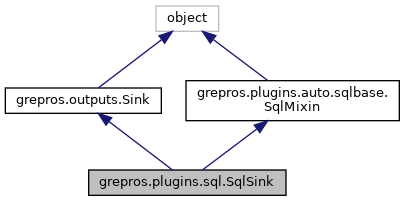Inheritance diagram for grepros.plugins.sql.SqlSink:

Public Member Functions | |
| def | __init__ (self, args=None, **kwargs) |
| def | close (self) |
| def | emit (self, topic, msg, stamp=None, match=None, index=None) |
| def | validate (self) |
 Public Member Functions inherited from grepros.outputs.Sink Public Member Functions inherited from grepros.outputs.Sink | |
| def | __enter__ (self) |
| def | __exit__ (self, exc_type, exc_value, traceback) |
| def | autodetect (cls, target) |
| def | bind (self, source) |
| def | emit_meta (self) |
| def | flush (self) |
| def | is_highlighting (self) |
| def | thread_excepthook (self, text, exc) |
Public Attributes | |
| valid | |
 Public Attributes inherited from grepros.outputs.Sink Public Attributes inherited from grepros.outputs.Sink | |
| args | |
| source | |
| inputs.Source instance bound to this sink More... | |
| valid | |
| Result of validate() More... | |
Static Public Attributes | |
| DEFAULT_ARGS = dict(WRITE_OPTIONS={}, VERBOSE=False) | |
| Constructor argument defaults. More... | |
| tuple | FILE_EXTENSIONS = (".sql", ) |
| Auto-detection file extensions. More... | |
| list | MESSAGE_TYPE_BASECOLS |
| Default columns for message type tables, as [(column name, ROS type)]. More... | |
 Static Public Attributes inherited from grepros.outputs.Sink Static Public Attributes inherited from grepros.outputs.Sink | |
| DEFAULT_ARGS = dict(META=False) | |
| Constructor argument defaults. More... | |
| tuple | FILE_EXTENSIONS = () |
| Auto-detection file extensions for subclasses, as (".ext", ) More... | |
 Static Public Attributes inherited from grepros.plugins.auto.sqlbase.SqlMixin Static Public Attributes inherited from grepros.plugins.auto.sqlbase.SqlMixin | |
| DEFAULT_ARGS = dict(META=False, WRITE_OPTIONS={}, MATCH_WRAPPER=None, VERBOSE=False) | |
| Constructor argument defaults. More... | |
| string | DEFAULT_DIALECT = "sqlite" |
| Default SQL dialect used if dialect not specified. More... | |
| dictionary | DIALECTS |
| Supported SQL dialects and options. More... | |
| list | KEYWORDS |
| Words that need quoting if in name context, like table name. More... | |
Private Member Functions | |
| def | _ensure_open (self) |
| def | _process_nested (self, msg, rootmsg) |
| def | _process_topic (self, topic, msg) |
| def | _process_type (self, msg, rootmsg=None) |
| def | _write_entity (self, category, item) |
| def | _write_header (self) |
Private Attributes | |
| _batch | |
| _batch_metas | |
| _close_printed | |
| _file | |
| _filename | |
| _nested_types | |
| _nesting | |
| _overwrite | |
Detailed Description
Writes SQL schema file for message type tables and topic views. Output will have: - table "pkg/MsgType" for each topic message type, with ordinary columns for scalar fields, and structured columns for list fields; plus underscore-prefixed fields for metadata, like `_topic` as the topic name. If launched with nesting-option, tables will also be created for each nested message type. - view "/full/topic/name" for each topic, selecting from the message type table
Constructor & Destructor Documentation
◆ __init__()
| def grepros.plugins.sql.SqlSink.__init__ | ( | self, | |
args = None, |
|||
| ** | kwargs | ||
| ) |
@param args arguments as namespace or dictionary, case-insensitive;
or a single path as the file to write
@param args.write output file path
@param args.write_options ```
{"dialect": SQL dialect if not default,
"nesting": true|false to created nested type tables,
"overwrite": whether to overwrite existing file
(default false)}
```
@param args.meta whether to emit metainfo
@param args.verbose whether to emit debug information
@param kwargs any and all arguments as keyword overrides, case-insensitive
Reimplemented from grepros.outputs.Sink.
Member Function Documentation
◆ _ensure_open()
|
private |
◆ _process_nested()
|
private |
◆ _process_topic()
|
private |
◆ _process_type()
|
private |
◆ _write_entity()
|
private |
◆ _write_header()
|
private |
◆ close()
| def grepros.plugins.sql.SqlSink.close | ( | self | ) |
Rewrites out everything to SQL schema file, ensuring all source metas.
Reimplemented from grepros.outputs.Sink.
◆ emit()
| def grepros.plugins.sql.SqlSink.emit | ( | self, | |
| topic, | |||
| msg, | |||
stamp = None, |
|||
match = None, |
|||
index = None |
|||
| ) |
Writes out message type CREATE TABLE statements to SQL schema file.
Reimplemented from grepros.outputs.Sink.
◆ validate()
| def grepros.plugins.sql.SqlSink.validate | ( | self | ) |
Returns whether "dialect" and "nesting" and "overwrite" parameters contain supported values and file is writable.
Reimplemented from grepros.outputs.Sink.
Member Data Documentation
◆ _batch
◆ _batch_metas
◆ _close_printed
◆ _file
◆ _filename
◆ _nested_types
◆ _nesting
◆ _overwrite
◆ DEFAULT_ARGS
|
static |
◆ FILE_EXTENSIONS
|
static |
◆ MESSAGE_TYPE_BASECOLS
|
static |
◆ valid
The documentation for this class was generated from the following file: